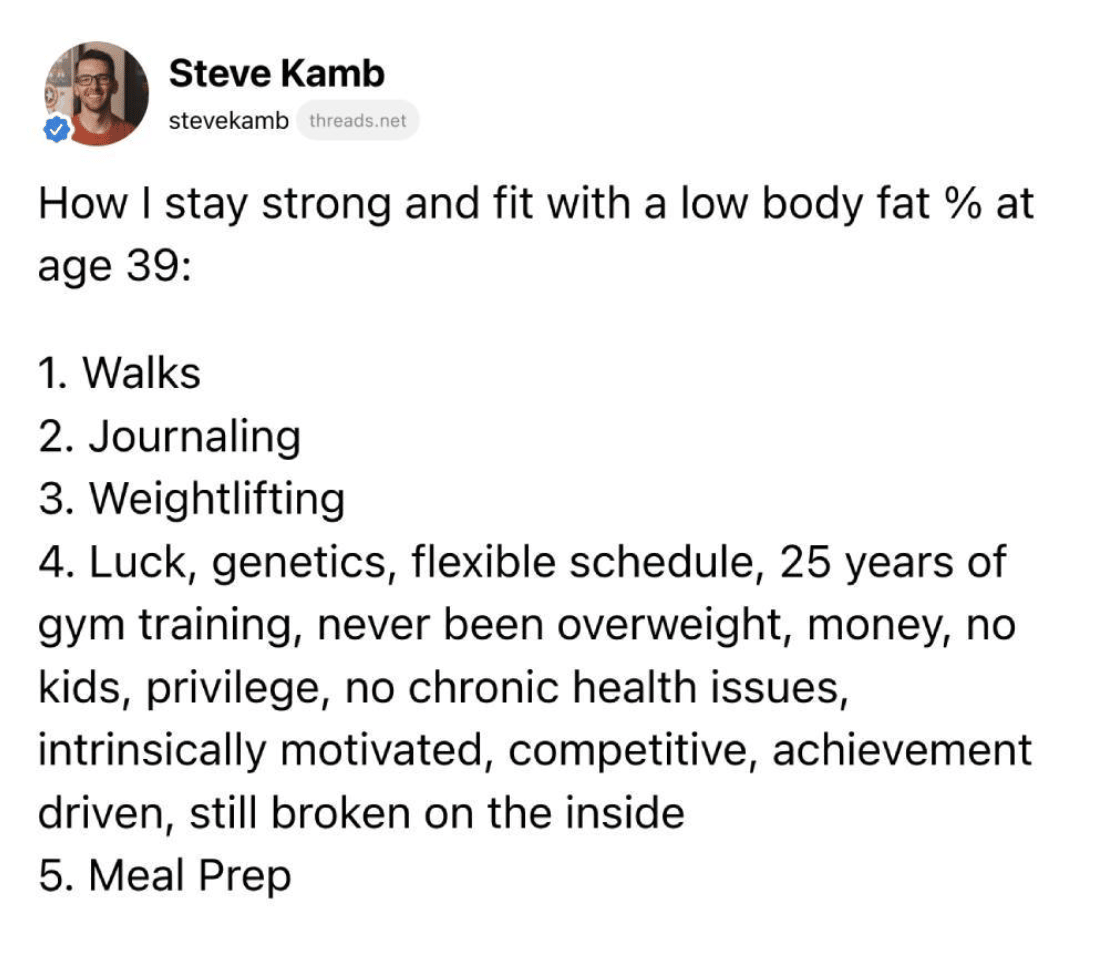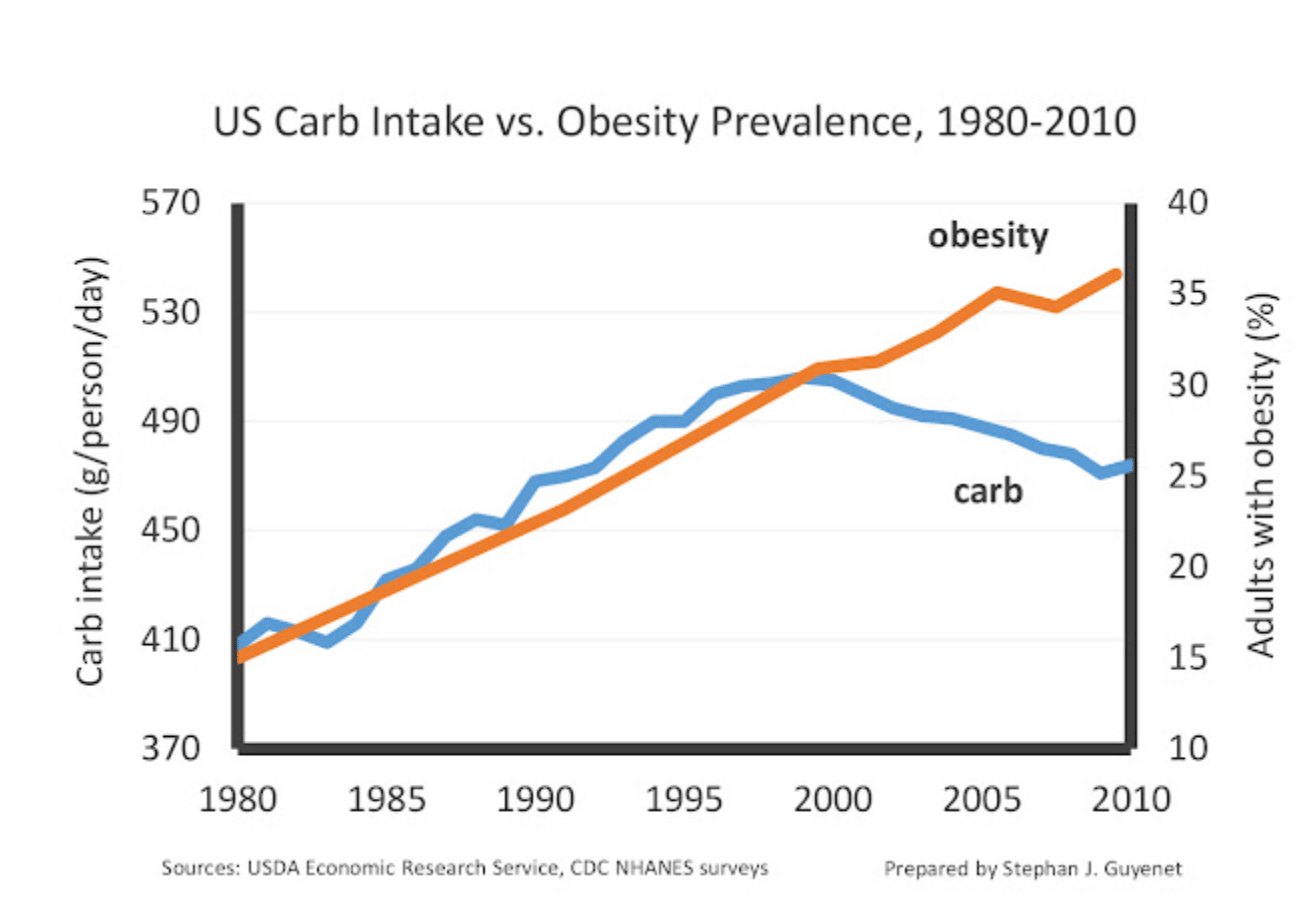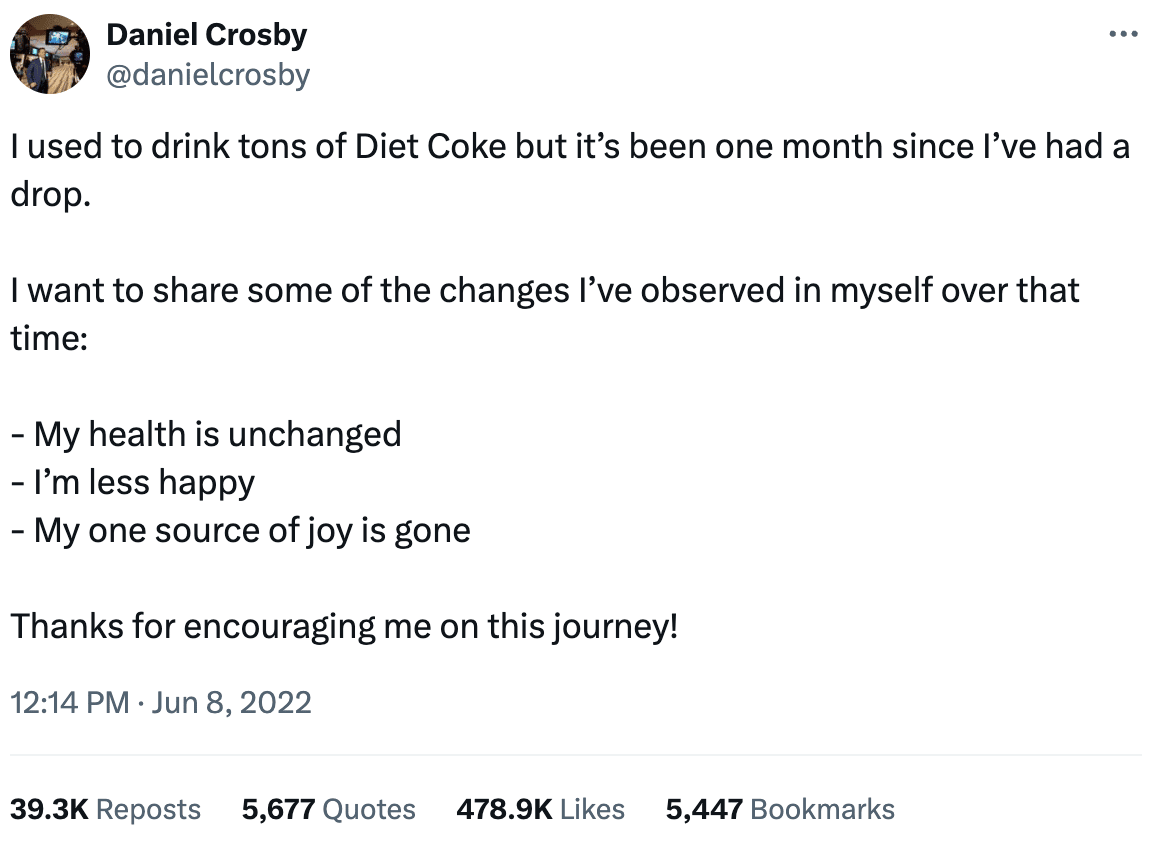This
post was originally published on
this siteOriginally posted at: http://www.nerdfitness.com/
In 2009, I was an enthusiastic, optimistic, and slightly (very) naive nerd who started NerdFitness.com to help other nerds level up their lives and live a tiny bit better.
Since then, I’ve done my best to build an identity as a lifelong learner who isn’t tied to a specific ideology or philosophy. This meant I got plenty of things right, and I also managed to get plenty of things wrong.
Certain views I held in the past were factually incorrect. While others were “correct,” but turned out to be ineffective and unhelpful.

As I continue my 15th year of Nerd Fitness, I wanted to revisit 5 viewpoints or philosophies I’ve changed my mind on.
I’m hoping this might give you permission and 20 Seconds of Courage to update your personal philosophy when presented with new facts or experiences.
(Steve’s Note: if any of these give you a viscerally negative reaction, take this as a learning experience! Reflect on why! More on this in the conclusion.)
5 core fitness beliefs I no longer have:
- “We all have the same 24 hours in the day.”
- “Going low carb is crucial for weight loss.”
- “Free weights are superior to weight machines.”
- “Diet Coke is bad for you.”
- “Obesity is due to lack of discipline.”
#1: “We all have the same 24 hours in the day.”
As a naive 25-year old single dude, this was probably the most cringe-worthy philosophy I held. I loved productivity/hustle culture.
I believed everybody had the same amount of time, everybody had the same opportunities, and successful, fit, organized people were simply those who were more disciplined and managed their time better than the rest of us.
Now, as I approach forty, I realize just how naive and unhelpful this perspective was.
Yes, a 25-year old single dude, a 45-year old mom working two jobs, and a person with chronic pain caring for an elderly parent technically “have the same 24 hours in the day.”
Of course single moms working two jobs, or people who also have to be full-time caregivers, don’t have the same opportunities or time to dedicate to themselves every day as a single 25 year old dude. There’s unbelievable privilege that comes with that perspective, and it’s really unhelpful to the majority of people these days.
I failed to recognize how instrumental luck and privilege have been for me:

Rather than telling people it’s their fault for not being more disciplined, a far better starting point is acknowledging and accepting the truth: people have different starting points and different life situations.
We can then do our best to find a path through this broken system, as flawed humans, to carve out a tiny bit of progress and fulfillment each day.
#2: “Going low carb is crucial for weight loss.”
In 2009, I wrote the article on The Paleo Diet.
It was read by tens of millions of people. I was invited to speak at Paleo Conferences. I got to be part of the cool kid club who eschewed conventional wisdom about nutrition. I found the answer to all of modern society’s health problems.
The problem was that I was wrong.
Many years ago, I read Marion Nestle’s Why Calories Count. I learned about Metabolic Chambers. I discovered properly funded, properly tracked studies about carbs and fat, which revealed the following:
“Strong data indicate that energy balance is not materially changed
during isocaloric substitution of dietary fats for carbohydrates.
Results from a number of sources refute both the theory and effectiveness of the carbohydrate-insulin hypothesis. Instead, risk for obesity is primarily determined by total calorie intake.”
In other words, it’s not the “carb-insulin hypothesis.” It’s the fact that we’re eating too many calories without realizing it.

(This is why intermittent fasting can feel like effortless weight loss for some. It works, but not because of some fancy physiological adaptation or magic fat-burning protocol. It’s because it removes some of our daily opportunities to unconsciously overeat).
My nuanced take on nutrition in 2024:
A calorie IS a calorie, just like a mile is a mile or a pound is a pound. It’s a unit of measure. At the same time, what we eat can affect how much we eat, how full we feel, how much energy we have to complete our workouts, and more.
This is why so many people have found success on so many different types of diets. Because they found a set of guidelines that helped them maintain a caloric deficit, not because there was any magic in that specific protocol.
Personally, I got as lean as possible while eating a proportionally large amount of carbs and low fat. Here’s how I did it: I was meticulous with my calorie tracking, ensuring I consumed enough protein and was in a caloric deficit.
I bring all of this up to make a point:
By all means, feel free to go low carb! Or low fat! Some people will feel differently on a low carb diet or a low fat diet. It’s unique to each person and their particular situation. If you eat enough protein and consume the right calories for your goal, either can work for weight loss.
Just remember weight loss comes down to behavior change, compliance, consistency, and math.
If you’re wondering, here’s the most consistent way we’ve found to do so: Eating less processed foods that are easy to overconsume, prioritizing nutrient-dense whole foods, and balancing your total energy intake. We cover all this in our guide to “healthy” eating.
#3: “Free weights are superior to weight machines.”
I’m a huge fan of free weights, and I used to say “weight machines are bad compared to free weights.” It made me feel old-school and primal, and fit into the narrative of “modern society is terrible compared to old school” (aka Paleo + strength training).
There was a big problem with this perspective:
I was acting like a fitness gatekeeper:
“You aren’t training correctly unless you do it this way.”
This is how I feel about that perspective now:

I never reflected on the idea of how demotivating it would feel to hear a specific type of exercise isn’t good enough. Ugh. My job isn’t to give you the BEST or ONLY way to work out. It’s to help you overcome any hurdle, internal or external, that’s keeping you from exercise.
Luckily, I updated this perspective years ago.
As far as I’m concerned, any exercise is good exercise. In fact: an exercise is only as good as its relevance towards any specific goal. Which means, for some goals (rehab, aesthetics, and even some strength training) there are times when machines are SUPERIOR to free weights.
Specific types of exercise can help for certain physique goals, but gatekeeping around what types of exercise is best isn’t helpful, especially when my job is to inspire beginners to get started!
I personally believe everybody, no matter their shape, gender, age, size, will improve their life by strength training. And for that reason, ANY kind of strength training is okay in my book.
If you’re new to a gym, use wherever you feel most comfortable with – machines or free weights. Over time, you can try all of the different options out and see what floats your boat.
Strength training of any variety teaches your muscles how they should be getting stronger, and it gets you moving and building confidence.
#4: “Diet Coke is bad for you.”
As part of my Paleo past, I would have told you that non-calorie sweetened beverages were scientific monstrosities and bad for you.
Here’s really what happens when you drink a diet soda instead of its full-calorie alternative:
You consume fewer calories. That’s about it.
As this study points out:
“There were no statistically significant associations of reported diet soda and NAS consumption with fasting insulin, fasting glucose, or incident diabetes.”
As this researched article from Precision Nutrition points out:
- Does diet soda cause us to want to eat MORE sugary foods? “The conclusion of those studies: Among those who consumed the high-intensity sweetener, the desire to eat sweet foods was slightly lower.”
- Does diet soda spike insulin and promote weight gain? “Overall, human studies show these insulin spikes are so small they’re hard to detect and very short-lived. Which makes it unlikely they impact weight loss at all, given what we know now.”
- Does diet soda cause health problems? Every governmental body that has reviewed [artificial sweeteners]—they’ve done it extensively in the United States, Australia, Europe, Japan, and Canada—concludes that when used in reasonable amounts, they’re not harmful.” (studies that show adverse effects are often done on rats, and in daily quantities no human consumes.)
Your perspective on whatever governmental body might influence how you feel about diet soda, so by all means, make your personal decision on this. You’re an adult, and you can choose what to eat and drink.
But here’s some zero-calorie food for thought:
Let’s start with some light cognitive dissonance: If you’re reading this and thinking, “things from nature are good, unnatural things are BAD!” I get it. I felt similarly.
There are major industries built around these “Naturalistic fallacies” and “appeals to nature:” modern life is bad, nature is good. (Weirdly, these people who appeal to nature often have processed “natural” supplements to sell us!)
What’s the actual science say? Everything is made from chemicals. Just because something is “natural” doesn’t mean it’s automatically healthy (hellooooo, hemlock!). And just because something is modern or “created” doesn’t mean it’s automatically unhealthy.
We can be smarter than this, and evaluate things with facts instead of our feelings.
Which can include diet soda.
And I do believe this requires nuance too.
In 2023, aspartame was classified as a 2b carcinogen, which means “possibly carcinogenic to humans.”
I understand why this would give you pause, and could be a reason you choose to not consume beverages with aspartame. That’s 100% your call.
I’ll explain my thoughts on this below, but we must first take a quick detour:
Did you know what’s on the Type 1 list for carcinogens?
Alcohol!
In fact, the World Health Organization states:
“Alcohol causes at least seven types of cancer, including the most common cancer types, such as bowel cancer and female breast cancer. Ethanol (alcohol) causes cancer through biological mechanisms as the compound breaks down in the body, which means that any beverage containing alcohol, regardless of its price and quality, poses a risk of developing cancer.”
“We cannot talk about a so-called safe level of alcohol use. It doesn’t matter how much you drink – the risk to the drinker’s health starts from the first drop of any alcoholic beverage. The only thing that we can say for sure is that the more you drink, the more harmful it is – or, in other words, the less you drink, the safer it is.”
While aspartame is “possibly carcinogenic,” alcohol is definitely carcinogenic to humans.
Despite this, many of us still choose to consume alcohol (hopefully in moderation). Cured meats, including bacon (often described by wellness gurus as “nature’s candy”) is also on that Type 1 carcinogen list.
Remember this when you see a health influencer telling you diet coke is poison, followed by their “natural” margarita cocktail recipe. They are using the very same “appeal to nature” fallacy while cherry picking the things that fit their narrative.
So, where does this leave us?
Every day, we all have to choose what’s important to us, what we choose to optimize, what we consume and in what quantity, what indulgences we allow, and more.
And we all have different goals, and are in different life stages.
If you personally decide to NOT consume diet soda, or you’re allergic to a specific non-calorie sweetener, great!
If you decide that drinking Diet Coke provides you with some daily joy, who am I to take that from you?

My nuanced perspective on diet soda, as of April 2024:
Life is a series of trade-offs.
Is drinking water better than diet soda? Possibly!
Is diet soda better than full calorie soda, especially for weight loss (which reduces risk for all-cause mortality)? Most likely!
For many people who struggle with obesity-related health conditions, reducing calories is an important step for their health, and doing so by switching to diet soda might be the most successful strategy for them right now.
Should people consume diet beverages in moderation, like pretty much everything else in life? Probably!
Is it possible new studies and information will change my perspective on this? Of course.
#5: “Obesity is due to lack of discipline.”
Obesity is a complex topic that I’ve changed my perspective on pretty dramatically.
Let me start with a quick caveat:
Yes, data shows that maintaining a healthy weight significantly decreases risks for a plethora of diseases and health conditions.
At the same time, many people have no plans or desire to lose weight. Great! Everybody deserves the opportunity to live the life they want, with the goals they choose, free of public shame or guilt as a result. So, people who shame others or make fun of them for their size or any physical attribute can go pound sand.
With that said…
I want to focus on people who are trying to lose weight for any reason (aesthetic, health, or performance)…and are struggling to find success.
I used to believe they simply needed more discipline and structure to eat fewer calories. (See #1 for how naive this perspective is)
15 years later, I now know there’s something far greater at work here, at a deeply physiological and psychological level.
We humans have prehistoric bodies and brains, equipped to survive in times of scarcity, and yet most of us live in an scenario of overabundance. We’re all surrounded by readily available hyperpalatable foods, we have social relationships structured around food, we have biological and historical relationships with food, and we have individual genetic differences in hunger.
Which brings me to one of the fascinating things about recent weight loss medicine research (GLP-1 Agonists like Wegovy or Ozempic). Although more studies are coming out regularly, and our understanding of these drugs continues to evolve, one of the primary factors they seem to alter is “food noise.” For many, having thoughts of food all day every day is a fact of life.
And these drugs seem to allow many to finally quiet that noise and allow them to eat fewer calories without the typical physiological response of “we need to eat more!”
I reserve the right to change my opinion as more research and studies come out, but I believe my philosophy is consistent across all areas including weight loss medication or surgery: Here at Nerd Fitness, I want to help people live better and find whatever joy they can with their limited time in the Arcade of Life.
And many people are trying to lose weight and get healthier. The path they get there will be varied:
- For some, reducing caloric intake and strength training is enough to change habits and get healthy.
- For others, they might use weight loss medication or surgery as a tool to alter their behavior.
Does weight loss medication and surgery have side-effects? Yep! Are those side-effects going to be the same for everybody? Nope. Are those side-effects worth the tradeoff for the consistent reduction of body weight? For many (but not all), the answer to that is a resounding YES.
Each human is different. Each path to health and happiness thus should be different too.
You might be asking, “Why don’t people just get more disciplined and eat less instead of ‘cheating’ with weight loss drugs?”
That question isn’t helpful (and is a symptom of #1 above!) The better question is:
“Which tools are available to help each individual person get healthier?”
For many, it’s education around calories and making slightly healthier choices. For some, it’s weight loss medicine and therapy. For others, it’s all of the above.
We’re most interested in the end result (a healthy, happy life), and we’re open to the infinite paths to get there.
Final Thought: I reserve the right to be wrong.
If any of the above gave you a visceral response, reflecting on why is a great place to start.
It’s important to interrogate our own beliefs regularly, and ask if we’re falling into dogmatic cheerleading for “our team,” or if we’re doing the hard work to understand why we think what we think.
Nuance is in short supply on the internet, and we’re bombarded regularly with people who love to provide black-or-white explanations to all the world’s problems. Be wary of people who say they have it ALL figured out, and know exactly who the villains (or scapegoats) and heroes (or superfoods) are.
We can do better, and this is my attempt at trying to do better too.
After all, life is a series of tradeoffs.
We make choices every day, and we’re not always optimizing for the same thing. What works for one person might not work for the next person, and that doesn’t mean one person’s choices are morally superior, because we’re all playing a different game with a different scorecard.
Alan Watts once said:
“You are under no obligation to be the same person you were 5 minutes ago.”
I’m personally glad I’m not under any obligation to be who I was 15 years ago, because I’ve learned a lot and lived a lot of life between then and now.
I reserve the right to update my nuanced perspective on all the above, and I encourage you to do the same.
Build your identity around “I want to learn more,” and update your personal philosophy as you live more life.
I’ll be over here, picking up heavy weights, enjoying carbs, going for walks, drinking a diet Ginger Ale, occasionally enjoying a bourbon on the rocks, and not judging others for how they choose to live.
-Steve
The post 5 fitness beliefs I’ve changed my mind on: first appeared on Nerd Fitness.

 For now classes are 6pm and 640pm at 2840 Wildwood st in the Boise Cloggers studio.
Book your class NOW!
click this ==>
For now classes are 6pm and 640pm at 2840 Wildwood st in the Boise Cloggers studio.
Book your class NOW!
click this ==>








